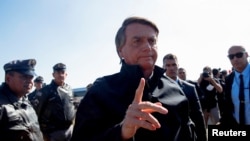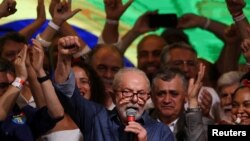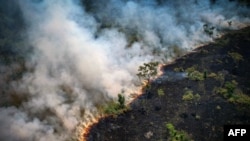Brazilian President Jair Bolsonaro lost his reelection bid October 30 after a bitter contest that returned left-wing former President Luiz Inacio Lula da Silva to power.
It remained unclear whether Bolsonaro, who considers former U.S. President Donald Trump an ideological ally, will accept the results of the voting. But what is clear is that during his campaign, Bolsonaro consistently misrepresented his stewardship of Brazil’s Amazon rainforest.
Why does that matter?
Because the Amazon, which covers an area about half the size of the U.S., is the world’s most important ecosystem. Its vast and diverse expanse of rivers, trees and vegetation sustains 10 percent of all species and 500 Indigenous communities. It produces about 6 percent of the world’s oxygen and is an enormous repository of carbon dioxide, the main cause of global warming.
Scientists estimate the forest stores the equivalent of five or six years’ worth of human-made carbon. But now, thanks to uncontrolled destruction in the forest – from logging, fires, grazing, and dams – they say the Amazon may have flipped to a net contributor to global warming.
The pace of that deforestation escalated rapidly under Bolsonaro and was a top campaign issue. Defending himself in September at the United Nations General Assembly, Bolsonaro said:
“Our agribusiness is a source of national pride. In the Brazilian Amazon region, an area as big as Western Europe, more than 88.0 percent of the rain forest remains untouched and pristine, contrary to what is often reported by the mainstream national and international media.”
But the claim that 88 percent of the Amazon is “untouched” is misleading.
In fact, Alberto Setzer, a senior scientist at Brazil’s National Institute for Space Research, told the PBS NewsHour that perhaps less than half the rainforest remains untouched by development, and it’s possible there may really be only “10 percent or 15 percent left.”
In September alone, the Amazon lost about 1,500 square kilometers to deforestation. That is roughly the size of greater London, according to The Guardian.
“Environmental criminals raced to wreck the region before a possible change of president could bring Jair Bolsonaro’s era of destruction to an end,” the paper reported.
The Guardian said illegal loggers and ranchers were “scrambling” to clear rainforest as quickly as possible before da Silva has a chance to reverse Bolsonaro’s lax development policies.
“The Climate Observatory watchdog said that [deforestation] figure was up 47.7% compared with last September and on a par with the destruction wrought in September 2019, the first year of Bolsonaro’s far-right administration. August saw an 81% rise in deforestation.
“The number of Amazon fires rose 147% compared with September 2021, with more than 41,000 blazes [were] detected by satellites.
“ ‘This is a very dangerous moment,’ warned Marcio Astrini, the Climate Observatory’s chief executive. ‘The Bolsonaro government is a forest-destroying machine.’ ”
Bolsonaro has encouraged an increase in farming, ranching, and mining in the Amazon. The environmental group Greenpeace said that under his rule, deforestation has increased by about 53 percent in the last three years.
National Public Radio (NPR) reported from Brazil that the government was doing little to punish those responsible for illegal logging and fires.
"I've been fined three times" for deforestation, one cattle rancher told NPR as he lit a blaze to clear grazing land. "But it's a joke. Nobody around here ever bothers to pay."
Critics say Bolsonaro dismantled environmental agencies and silenced activists. His administration cut funds for IBAMA, a Brazilian agency that monitors environmental policy, by 30 percent in 2019. The Environmental Department’s budget in 2021 was the lowest it's been since 2010. And there were 20 registered killings of environmental activists in 2021.
In his defense, Bolsonaro has pointed fingers at Indigenous people. In 2020, the Amazon was experiencing the worst fires in 10 years. That year, Bolsonaro told the U.N. General Assembly that “the fires practically occur in the same places, on the east side of the forest, where peasants and Indians burn their fields in already deforested areas.”
Da Silva has pledged to protect the forest. He served two terms as president from 2003 to 2011 and was able to reduce deforestation. He said that conserving natural resources and protecting biodiversity could produce a profit and be beneficial to the pharmaceutical and beauty industries.
Brazil’s largest agricultural organizations backed Bolsonaro’s campaign, as did many farmers.
Polygraph.info has previously fact-checked some of Bolsonaro’s suspect environmental claims:
- Bolsonaro’s New Climate Change Promises Weren’t New At All
- Bolsonaro’s Son Covers For Agribusiness on Amazon Deforestation
- Fantasy and Failure to Protect The Amazon Under Bolsonaro


